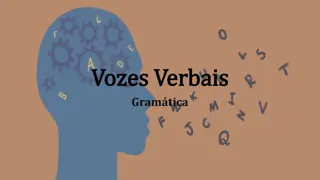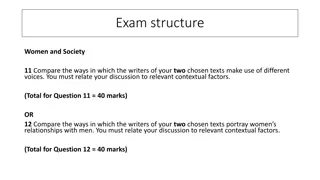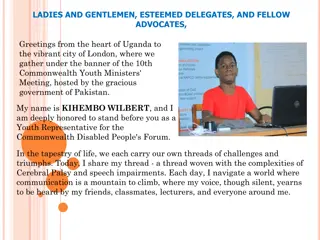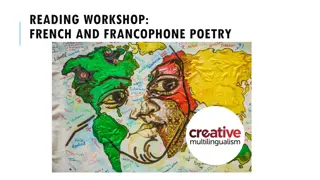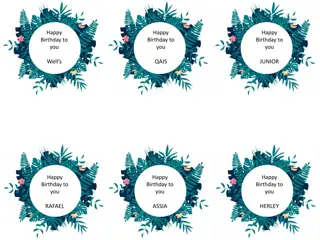Voices and Silences: The Writings of Assia Djebar
Assia Djebar's work uncovers the previously silenced voices of Algerian women in resistance against French colonization, weaving together personal experiences, politics, and history. Through her self-identification and use of language, she challenges societal norms and empowers women. Djebar's concerns about translation and representation reflect her deep introspection and commitment to authentically sharing marginalized stories.
Download Presentation

Please find below an Image/Link to download the presentation.
The content on the website is provided AS IS for your information and personal use only. It may not be sold, licensed, or shared on other websites without obtaining consent from the author.If you encounter any issues during the download, it is possible that the publisher has removed the file from their server.
You are allowed to download the files provided on this website for personal or commercial use, subject to the condition that they are used lawfully. All files are the property of their respective owners.
The content on the website is provided AS IS for your information and personal use only. It may not be sold, licensed, or shared on other websites without obtaining consent from the author.
E N D
Presentation Transcript
Silenced and Absent Djebar successfully represents what was formerly silenced and absent from representation, the participation of Algerian women in resistance struggles against French colonization of Algeria, and politicizes the everyday experiences of Algerian women in their global and historical contexts. Djebar does not position herself as a vehicle for silenced women, instead she illustrates the process whereby their stories inform her own search for voice and self. Representation becomes a deliberately political act for Djebar
Self-Identification Djebar identified herself as a Western-educated, Algerian, feminist, Muslim intellectual. She is considered a spokesperson for Algerian women, and women in general. She uses aphasia and silence as a form of expression and resistance against male societal structures which paradoxically are said to promote this. Djebar also connects language to a woman s body.
Carrier of Fire Mildred Mortimer contends Djebar uses oral history to give voice to surviving heroines, the porteuses de feu of the Algerian revolution, and allows them to tell their own stories . Soheila Ghaussy concludes By deliberately blending fiction and experience, fictionality and language, and especially by gendering writing (ecriture) as male and orality (Kaalam) as female, moreover associating the former with French and the latter with Arabic, Djebar creates subtle and complicated links between the feminine spheres of oral languages and the male domain of writing.
Doubly Subjugated Within her own culture, an Arab woman is already the Other. By the French, she is subjugated because she is a woman and an object of colonisation. If writing is embedded in, or is dominated by, discourses of the hegemonic Other, how can one not belonging to the dominant group find modes of expression that reflects the specificity of one s own experiences?
Djebars Concerns: Can I, twenty years later, claim to revive these stifled voices? And speak for them? Shall I not at best find dried-up streams? What ghosts will be conjured up when in this absence of expression of love (love received, love imposed), I see the reflection of my own barrenness, my own aphasia . To attempt an autobiography using French words alone is to lend oneself to the vivisector s scalpel, revealing what lies beneath the skin . Autobiography practiced in the enemy s language has the texture of fiction . How would you respond to these concerns?
Translating The act of translating Arabic into French, translating Kaalam (the female) into ecriture (the male), puts Djebar in the position of an interpreter who has the power of eradicating clear-cut boundaries. Nicole Ward Jouve explains For many bilingual women translation is an activity by means of which the natural bond meaning-language can be transgressed. It is a state of continued suspension, allowing, in Walter Benjamin s words, the post- maturation of the foreign speech, the birth throes of one s own speech. The process is therefore eminently feminine . When you translate, the absolute status of nouns, the Name-of-the-Father is shaken. Exchanges between words are no longer full , that is guaranteed by the law which rules and partitions women, which prevents femininity from coming into being. Explore the theme of translation in the novel.
Cultural Memory Cultural memory has been defined as the way a group of people with shared experiences, history and cultural identity construct ways of perceiving themselves. Cultural memory can also be described as the way the past is understood in a society at certain times and places. It is not restricted to presenting accurate and truthful testimonies of the past, but makes meaningful statements about the past in a given context of the future. Cultural memory is not exclusively concerned with valid facts, or even coherent methodology, but rather with the consensus of assumptions and prejudices shared by a culture or society. Thus, as interpretations of the past change, so do cultural memories. How does Djebar construct a new cultural memory?
Adlai Murdoch explains The colonisers discourse becomes so pervasive that it is systematically accepted as the final and authoritative definition of the culture in whose name it purports to speak and which in effect it circumscribes. It is the subversion and reversal of this practice, the putting in place of a new form of writing that will speak to the anguish of alienation and the desire for recognition and identity on the part of the dispossessed, that Djebar attempts to effect here. A question that stems from this is, who is entitled to speak for past events in the present?
Murdoch believes Djebar makes her novel problematic For, in situating herself as a writer who must come to terms with the history of Algeria and with herself as a postcolonial, Arab, female subject writing in French about women who do not speak French and cannot speak for themselves, Djebar s narrative will inevitably problematize its own discourse to the point where its own tenuous coherence threatens to dissolve.
Feminine Language How would you define feminine language or what French feminists define as ecriture feminine ? How is feminine language used in Fantasia? Is it used as a feminist strategy? What are the difficulties and limitations of positing a feminine language ?
Polarities Explore the theme of subjugation and resistance. Explore the theme of sound and silence in the novel. How does Djebar fuse his-story with her- story? What effect does it have to mix the written narratives by men and the oral accounts by women?
Djebar asks: If Woman is defined as Other, can she then speak? Can she express herself and her specifically female experiences? And if so, whose language, whose voice is she using in doing so? How does Otherness and appropriation affect Algerian women in light of colonisation?
Structure Why does Djebar shift between the distant past, recent past, and autobiographical accounts of coming of age? What effect does this shift have on the reader? Fantasia blurs genres by incorporating travel narratives, historical colonial documents, interviews and autobiography. What is the purpose of crossing genres? How can we interpret this?




